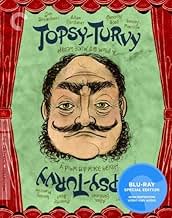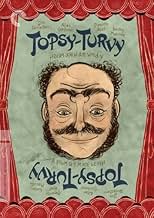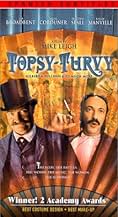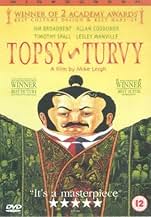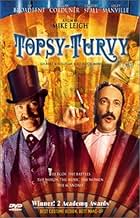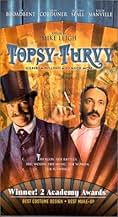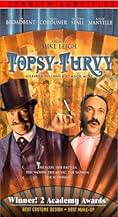IMDb रेटिंग
7.3/10
14 हज़ार
आपकी रेटिंग
अपनी भाषा में प्लॉट जोड़ेंSet in the 1880s, chronicles how during a creative dry spell, the partnership of the legendary musical/theatrical writers Gilbert and Sullivan almost dissolves, before they turn it all aroun... सभी पढ़ेंSet in the 1880s, chronicles how during a creative dry spell, the partnership of the legendary musical/theatrical writers Gilbert and Sullivan almost dissolves, before they turn it all around and write the Mikado.Set in the 1880s, chronicles how during a creative dry spell, the partnership of the legendary musical/theatrical writers Gilbert and Sullivan almost dissolves, before they turn it all around and write the Mikado.
- 2 ऑस्कर जीते
- 13 जीत और कुल 28 नामांकन
Bill Neenan
- Cook
- (as William Neenan)
फ़ीचर्ड समीक्षाएं
10Fab4Fan
TOPSY-TURVY, director Leigh's spectacularly entertaining look at the lives and times of the nineteenth-century British duo that gave the world such musical treasures as The Pirates of Penzance and HMS Pinafore. Leigh's film finds G & S in 1884 at a creative impasse following the disappointing reception of their new flop operetta, Princess Ida. Sullivan (Allan Corduner), tired of writing music for the increasingly trite and repetitive librettos of Gilbert (Jim Broadbent), wants to give up their lucrative partnership and write "serious" grand opera. But when an exhibition of Japanese art and culture travelling through London inspires Gilbert to begin writing The Mikado, both men see the opportunity to create something unique and extraordinary. Praise for this stunning film must extend from top to bottom, beginning to end. The music, of course, is wonderful and ever present. The costumes, sets and cinematography are exemplary in their attention to atmosphere and detail. Leigh's script and direction not only bring the period to life, but make it crackle with drama, wit, and social comment. And the performances are fabulous, notably the magnificent Broadbent as mercurial Gilbert; Corduner, warm and charming as the more sweet-natured Sullivan; and Leigh regular Timothy Spall (SECRETS & LIES) as a veteran actor fearful that his big number may be cut. This is quite simply one of the most vastly entertaining, joyous and fascinating films ever made about the creative process. I actually saw it twice within a three-day period and wasn't bored for one second of either viewing!
Mike Leigh's gloriously entertaining film, `Topsy-Turvy,' offers a wise and witty slice of musical theater history. Set in 1880's London, the movie chronicles the extraordinary personal and professional relationship between two giants of the 19th Century entertainment world, lyricist `Willie' Gilbert and composer Arthur Sullivan. The screenplay, wisely, chooses to pick up the tale not at the very beginning of their collaborative career - tracing its rise and fall as many biopics would do - but rather at the point where the team has already garnered international fame and success but seems of late to be experiencing a bit of creative stagnation. Sullivan, tiring of the seemingly trivial nature of the librettos they've been producing, wants to break away and embark on his own to produce a work of more `weighty' merit. Gilbert, on the other hand, delights in his success and, although bothered by comments in the press that his work has begun to repeat itself, initially resists Sullivan's plea that they abandon their hitherto winning formula.
Thus, the conflict between the two men of creative genius plays itself out against the fascinating backdrop of a deliciously recreated vision of the theatrical world of a hundred-odd years ago. Just as important to the film as the two main characters is the rich assortment of secondary players - theater proprietors, company actors, wives, lovers and parents - who swirl around the principals and provide a colorful tapestry to match the exquisite art direction and costuming that adorn the film. In addition, Leigh incorporates clever references to some of the technological marvels just making their appearance at the time: telephones, reservoir pens and luxury hotels with baths for every room!
Leigh's pacing is admirably unhurried and relaxed. So rich is the detail of his vision that fully thirty-five minutes elapse before the two lead characters even have their first scene together. In addition, the inspiration for `The Mikado' - ostensibly the centerpiece of the film's plot - doesn't strike Gilbert until well into the second hour. Yet, the film never falters in interest, least of all when Leigh devotes long stretches of footage to showing us the actors rehearsing their parts or having us eavesdrop on some behind-the-scenes salary negotiations or discussions of artistic differences. This is the real triumph of the film: Leigh opens up a world to us by letting us see the fascinating nuts-and-bolts aspects of the creative process to which we, as members of a theatre audience, are rarely privy. He also is not afraid to linger long over many a beautiful reproduction of the musical pieces themselves. Leigh can count his film a success in that it makes us want to rush out and catch a performance of one of these operettas ourselves.
The film would not be the splendid success it is were it not for the dazzling performances of its amazingly large cast. Jim Broadbent and Allan Corduner are perfection as the good-natured but often antagonistic partners, never playing the humor too broadly or violating the spirit of elite British gentility even in their most conflict-laden moments.
Indeed, it is this very quality of quiet subtlety that permeates every aspect of `Topsy-Turvy' and that makes it the wholly satisfying and entertaining film it is.
Thus, the conflict between the two men of creative genius plays itself out against the fascinating backdrop of a deliciously recreated vision of the theatrical world of a hundred-odd years ago. Just as important to the film as the two main characters is the rich assortment of secondary players - theater proprietors, company actors, wives, lovers and parents - who swirl around the principals and provide a colorful tapestry to match the exquisite art direction and costuming that adorn the film. In addition, Leigh incorporates clever references to some of the technological marvels just making their appearance at the time: telephones, reservoir pens and luxury hotels with baths for every room!
Leigh's pacing is admirably unhurried and relaxed. So rich is the detail of his vision that fully thirty-five minutes elapse before the two lead characters even have their first scene together. In addition, the inspiration for `The Mikado' - ostensibly the centerpiece of the film's plot - doesn't strike Gilbert until well into the second hour. Yet, the film never falters in interest, least of all when Leigh devotes long stretches of footage to showing us the actors rehearsing their parts or having us eavesdrop on some behind-the-scenes salary negotiations or discussions of artistic differences. This is the real triumph of the film: Leigh opens up a world to us by letting us see the fascinating nuts-and-bolts aspects of the creative process to which we, as members of a theatre audience, are rarely privy. He also is not afraid to linger long over many a beautiful reproduction of the musical pieces themselves. Leigh can count his film a success in that it makes us want to rush out and catch a performance of one of these operettas ourselves.
The film would not be the splendid success it is were it not for the dazzling performances of its amazingly large cast. Jim Broadbent and Allan Corduner are perfection as the good-natured but often antagonistic partners, never playing the humor too broadly or violating the spirit of elite British gentility even in their most conflict-laden moments.
Indeed, it is this very quality of quiet subtlety that permeates every aspect of `Topsy-Turvy' and that makes it the wholly satisfying and entertaining film it is.
10ahab1013
Simply put, a brilliant film.
Topsy Turvy captures Gilbert and Sullivan in the midst of a turbulent period in their partnership. Desperate to be taken more seriously as a composer, Arthur Sullivan attempts to renege on the Gilbert and Sullivan contract with the Savoy Theatre. While his partner William S Gilbert struggles to come up with something new to write about. Each man, in a sense, is longing for individual acclaim but they are trapped in an entity neither one can shake. The fame of their collective energies has taken on a life of its own and the theater crowds want more.
The film is mostly the story of a theater production of the Mikado, one of Gilbert and Sullivan's most famous operas. Director Mike Leigh, notorious for writing on the go, has structured a play within a play to a great delight. Jim Broadbent and Allan Corduner are brilliant as Gilbert and Sullivan, and Tim Spall has a wonderful turn as one of the actors, Mr. Temple.
Their is more here than just two playwrights. The entire cast is seen as more than just pieces of a production. From choristers to administrative personnel, Topsy Turvy is alive with characters. One of the best is Gilbert's long-suffering wife Kitty. Bereft of children and saddled with a husband who doesn't show outward affection, Kitty (Lucy) could be a two dimensional afterthought. However, her pain at being childless is wonderfully played by Lesley Manville. It is clear they love each other but neither is capable of articulating that love, very odd for a man who writes for a living.
Filled with humor and grace, Topsy Turvy is one of the best films about acting and a beautiful embrace of all things theatrical.
Topsy Turvy captures Gilbert and Sullivan in the midst of a turbulent period in their partnership. Desperate to be taken more seriously as a composer, Arthur Sullivan attempts to renege on the Gilbert and Sullivan contract with the Savoy Theatre. While his partner William S Gilbert struggles to come up with something new to write about. Each man, in a sense, is longing for individual acclaim but they are trapped in an entity neither one can shake. The fame of their collective energies has taken on a life of its own and the theater crowds want more.
The film is mostly the story of a theater production of the Mikado, one of Gilbert and Sullivan's most famous operas. Director Mike Leigh, notorious for writing on the go, has structured a play within a play to a great delight. Jim Broadbent and Allan Corduner are brilliant as Gilbert and Sullivan, and Tim Spall has a wonderful turn as one of the actors, Mr. Temple.
Their is more here than just two playwrights. The entire cast is seen as more than just pieces of a production. From choristers to administrative personnel, Topsy Turvy is alive with characters. One of the best is Gilbert's long-suffering wife Kitty. Bereft of children and saddled with a husband who doesn't show outward affection, Kitty (Lucy) could be a two dimensional afterthought. However, her pain at being childless is wonderfully played by Lesley Manville. It is clear they love each other but neither is capable of articulating that love, very odd for a man who writes for a living.
Filled with humor and grace, Topsy Turvy is one of the best films about acting and a beautiful embrace of all things theatrical.
Not being a big fan of opera (of the comedic variety or otherwise), I chose to watch this movie as a period piece, hoping to see a lot of eccentric characters putting on even more eccentric theatre. That was easy, since the trailer for the film points in that direction entirely.
What I didn't expect was a thoroughly entrancing inside view of the Victorian theatre. Not to mention comprehensive. Everyone is covered in this - from the stage boy through the chorus through the leads and producers and assistant directors. The telling of the complex relationships between the directors (Gilbert and Sullivan) and the leads is particularly poignant - whether dealing with the actors' considerable egos or their individual popularity among the chorus, nothing presented doesn't ring true.
I loved everything about this movie. It's a great story, told wonderfully by all involved. It is truly a film of much love and craft.
And I expect I'll be attending the next run of the Mikado next time it comes to town.
What I didn't expect was a thoroughly entrancing inside view of the Victorian theatre. Not to mention comprehensive. Everyone is covered in this - from the stage boy through the chorus through the leads and producers and assistant directors. The telling of the complex relationships between the directors (Gilbert and Sullivan) and the leads is particularly poignant - whether dealing with the actors' considerable egos or their individual popularity among the chorus, nothing presented doesn't ring true.
I loved everything about this movie. It's a great story, told wonderfully by all involved. It is truly a film of much love and craft.
And I expect I'll be attending the next run of the Mikado next time it comes to town.
10markt-9
I loved this film, yet I have a hard time understanding many of the comments other viewers have made. I never liked G&S all that much, thought they were rather light weight stuff. Never liked the late Victorian era much either. Kind of a dull time, I thought. Musicals are definitely not my thing.
Yet this movie struck me as one of the greatest I have ever seen, right up there with Greed and Citizen Kane and all that lot. I suppose it's because I like period pieces, and I think it's damned difficult for anyone to draw an accurate -- or even an evocative -- picture of any time that is not their own. This movie does that, and it never even appears to strain so much as a single hair to do so.
In the end, this movie is deeply *humane.* Like many another Mike Leigh epic, the characters here are drawn in the round, flaws and talents all on view, just like real human beings. And he likes them all, even the stinkers. Likes them well enough to paint them as they are, not as cardboard figures.
If you like your characters pre-digested and redrawn larger than life and your plots full of twists and turns, you might find this movie tame. If you like people, you'll find it fascinating, funny, and true as gold.
And why do I rate it so highly? Because it hangs together so perfectly, all of a piece. It's luscious to look at, delightful to hear, and sweet as candy without ever once becoming saccharine or cheap.
Some reviewers complained you had to "already know" something to enjoy this movie: the music, the time, the language, the whatever. I say, all you have to know is human beings. If you find them interesting, you'll love this movie.
Yet this movie struck me as one of the greatest I have ever seen, right up there with Greed and Citizen Kane and all that lot. I suppose it's because I like period pieces, and I think it's damned difficult for anyone to draw an accurate -- or even an evocative -- picture of any time that is not their own. This movie does that, and it never even appears to strain so much as a single hair to do so.
In the end, this movie is deeply *humane.* Like many another Mike Leigh epic, the characters here are drawn in the round, flaws and talents all on view, just like real human beings. And he likes them all, even the stinkers. Likes them well enough to paint them as they are, not as cardboard figures.
If you like your characters pre-digested and redrawn larger than life and your plots full of twists and turns, you might find this movie tame. If you like people, you'll find it fascinating, funny, and true as gold.
And why do I rate it so highly? Because it hangs together so perfectly, all of a piece. It's luscious to look at, delightful to hear, and sweet as candy without ever once becoming saccharine or cheap.
Some reviewers complained you had to "already know" something to enjoy this movie: the music, the time, the language, the whatever. I say, all you have to know is human beings. If you find them interesting, you'll love this movie.
क्या आपको पता है
- ट्रिवियाNot only did all the actors do their own singing, but everyone in the cast, including the pit orchestra and the actors who play instruments in the film, actually played the music they are seen to play.
- गूफ़This well known quote from the film is a factual mistake: "If you wish to write a Grand Opera about a prostitute, dying of consumption in a garret, I suggest you contact Mr Ibsen in Oslo. I am sure he will be able to furnish you with something suitably dull". The city of Oslo got the name in 1925 - a long time after Ibsen's death in 1906. During Ibsen's lifetime, the capital of Norway was called Kristiania.
- भाव
Helen Lenoir: The more I see of men, the more I admire dogs.
- क्रेज़ी क्रेडिटThe credit for "Location Vehicles" is misspelled "Location Vechicles".
- साउंडट्रैकIf You Give Me Your Attention
from "Princess Ida"
Music by Arthur Sullivan
Lyrics by W.S. Gilbert
Performed by Martin Savage and Chorus
टॉप पसंद
रेटिंग देने के लिए साइन-इन करें और वैयक्तिकृत सुझावों के लिए वॉचलिस्ट करें
- How long is Topsy-Turvy?Alexa द्वारा संचालित
विवरण
- रिलीज़ की तारीख़
- कंट्री ऑफ़ ओरिजिन
- भाषाएं
- इस रूप में भी जाना जाता है
- Mike Leigh Untitled
- फ़िल्माने की जगहें
- Richmond Theatre, 1 Little Green, Richmond, Greater London, इंग्लैंड, यूनाइटेड किंगडम(Savoy Theatre, London, England, UK)
- उत्पादन कंपनियां
- IMDbPro पर और कंपनी क्रेडिट देखें
बॉक्स ऑफ़िस
- बजट
- £1,00,00,000(अनुमानित)
- US और कनाडा में सकल
- $62,08,548
- US और कनाडा में पहले सप्ताह में कुल कमाई
- $31,387
- 19 दिस॰ 1999
- दुनिया भर में सकल
- $78,04,439
- चलने की अवधि2 घंटे 40 मिनट
- रंग
- ध्वनि मिश्रण
- पक्ष अनुपात
- 1.66 : 1
इस पेज में योगदान दें
किसी बदलाव का सुझाव दें या अनुपलब्ध कॉन्टेंट जोड़ें



